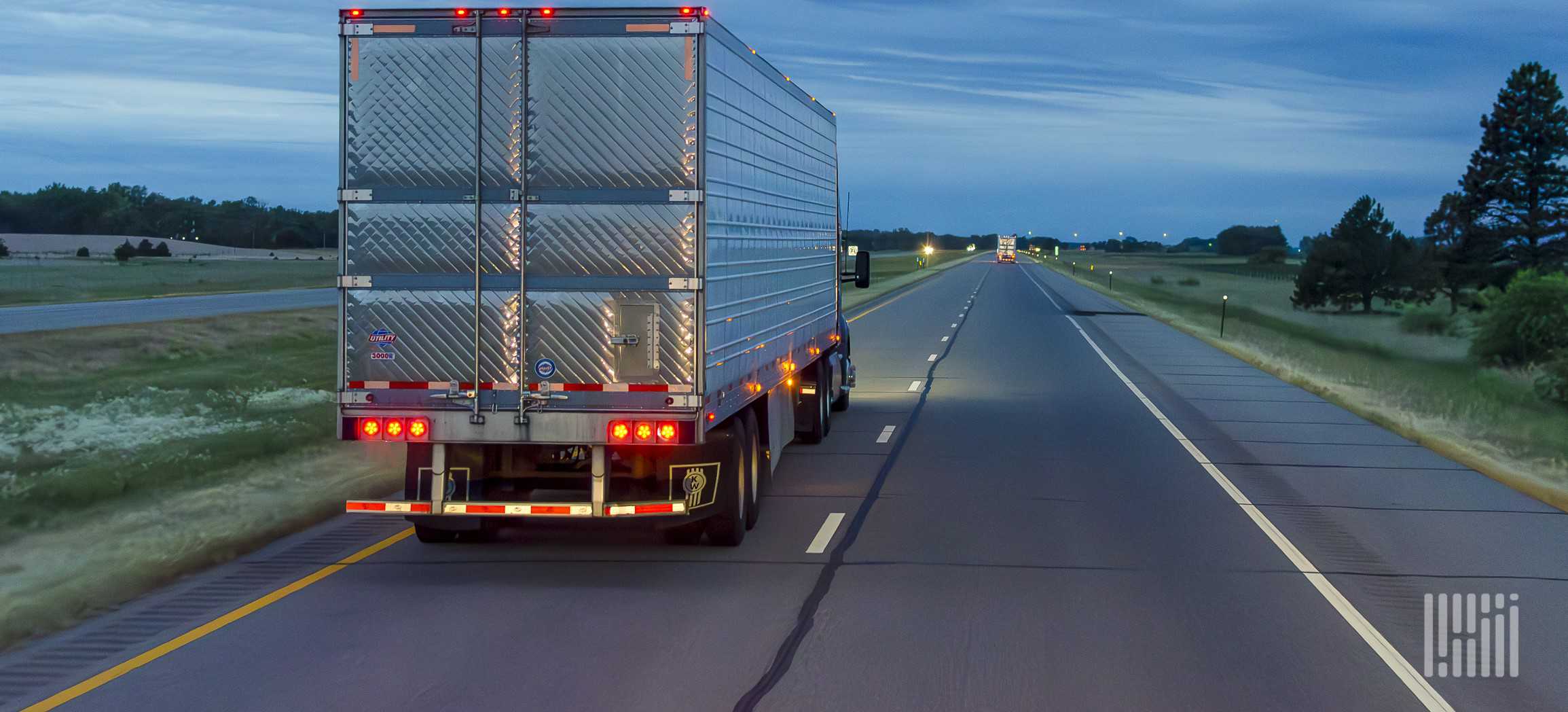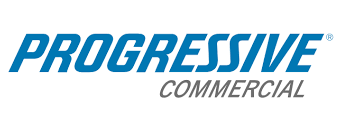Finding an insurer to cover long-haul truckers isn’t as simple as you think. Truckers drive long distances through unfamiliar territories, often carrying hazardous materials or dangerous equipment.
Most insurers don’t want to take on the added risk and only offer coverage if the trucker stays within a 300- or 500-mile radius. In this article, you’ll find our top picks for long haul trucking insurance to help you identify the most reliable and trustworthy option for your needs.
Quicklook: Best long haul trucking insurance company
- Best for new drivers: Progressive Commercial
- Best for fleet operators: Liberty Mutual
- Best for customer satisfaction: Aladdin Capital
- Best for affordability: CoverWallet
- Best for owner-operators: Sentry
- Best for 24/7 access: Lancer Insurance
- Best for high-risk drivers: Nationwide
What is long haul trucking insurance?
Long haul trucking insurance provides coverage for damages to property or injuries sustained by individuals in the event of an accident. These policies are for truckers traveling more than 250 miles.
How does long haul trucking insurance work?
An insurance policy is purchased by the truck owner, who can list other drivers of that specific vehicle. When there is an accident, the driver files a claim with the insurance carrier, who then investigates to be sure the incident is covered. Once they’ve evaluated the situation, the insurance company pays the claim by the benefits covered by the policy.
7 best long haul trucking insurance companies
Now let’s take a closer look at these companies and the type of coverage they provide to help you make the best decision for yourself.
Progressive Commercial
Progressive started as a company looking to help risky drivers who were unable to get policies with other providers. Over the years, they’ve earned a strong reputation working with high-risk drivers, which makes them the perfect company for new truckers.
They have several policies that won’t clean out a savings account of someone who’s just starting out. Progressive also offers numerous ways to cut back on your monthly premium costs once you sign up for a policy.
Best for: New drivers
Available: Available in all 50 states
Insurance coverage
- Primary liability
- Motor truck cargo
- Motor truck general liability
- Non-trucking liability
- Rental reimbursement with downtime
- On-hook towing
- Trailer interchange
Fleet size: All fleets of 30 drivers or fewer
Truck types
- Tractors
- Tow trucks
- Box trucks
- Dump trucks
- Agricultural trucks
- Flatbeds
- Front loaders
- Refrigerated
- Pump truck
- Step van
- Tank truck
- Garbage truck
- Catering truck
- Cement mixer
- Ice cream truck
Special features
- Progressive smart haul program
- CDL discount
- Paid in full discount
Benefits
- Discounts are given for safe driving
- Licensed commercial drivers pay less
- Save 15% by paying for the year upfront
Disadvantages
- Customer service is not always friendly
- Limited fleet size
- Limited travel radius
Pricing: Get a customized quote
Liberty Mutual Insurance
Liberty Mutual Insurance is a trusted provider with a long history of offering robust insurance solutions for businesses, including the trucking industry. Known for its financial strength and customizable policies, Liberty Mutual has become a go-to choice for long-haul truckers seeking comprehensive protection.
Their coverage options cater to large and small fleets, ensuring that businesses of any size are shielded from the unique risks of long-haul trucking.
Best for: Fleet operators
Available: Available in all 50 states
Insurance coverage
- Primary liability
- Physical damage coverage
- Motor truck cargo
- General liability
- Non-trucking liability
- Umbrella insurance
- Workers’ compensation
- Business interruption
Fleet size: Suitable for fleets of all sizes
Truck types
- Tractors
- Box trucks
- Refrigerated trucks
- Flatbeds
- Tankers
- Dump trucks
- Specialized trucks
Special features
- Risk management consulting
- 24/7 claims support
- Industry-specific coverage options
- Flexible payment plans
Benefits
- Tailored coverage options for unique trucking needs
- Comprehensive risk management tools to help lower costs
- Strong financial backing for claims reliability
Disadvantages
- Premiums may be higher for smaller fleets
- Limited online tools for policy management
Pricing: Get a customized quote
Aladdin Capital

Aladdin Capital is best known for being a true partner within the trucking industry. Leveraging their in-depth knowledge and experience within the transportation industry, they provide personalized support to help owner-operators and fleet owners navigate the challenges of running a smooth, successful operation.
Aladdin recognizes that a one-size-fits-all approach doesn’t apply in long haul trucking, so they invest time in understanding customers’ businesses to create tailored coverage and recommend appropriate policies. They also go the extra mile to provide personalized assistance in ensuring all claims are processed properly.
Best for: Customer satisfaction
Available: All 50 states in the U.S.
Insurance coverage
- Commercial auto liability
- Physical damage
- Cargo
- Bobtail insurance
- Occupational accident insurance (OCC/ACC)
- Non-owned trailer coverage
Fleet size: Any
Truck types
- Dry van, reefer and flatbed
- Tankers
- Dump trucks
- Box trucks
- Sprinter/cargo vans
- Construction vehicles
Special features:
- Offers range of financial solutions, including factoring, equipment leasing and financing
- IFTA filing services available
- DOT compliance support
- Fuel discount card
- A+ Better Business Bureau rating
Benefits: Solutions are completely customized to meet clients’ individual needs
Disadvantages: Aladdin focuses on bringing the best value to customers rather than the lowest costs, so coverage may not be the least expensive.
Pricing: Visit website for a customized quote
CoverWallet

Unlike the other companies on this list, CoverWallet is an insurance aggregator. They partner with different insurance agencies, so you only need to fill out one application to receive quotes from several carriers.
The ability to shop for many insurers at one time eases the process for customers. Because so many companies compete for your business, the rates are some of the lowest. Just review your policy to be sure you have all the coverage you need.
Best for: Affordability
Available: All states except Hawaii and Alaska
Insurance coverage
- General liability
- Bodily injury and property damage
- Physical damage
- Comprehensive
- Collision
- Towing and rental
- Uninsured and underinsured motorists
Fleet size: Call
Truck types
- Food trucks
- Dump trucks
- Hotshots
- Box trucks
- Car carriers
- Log trucks
- Trailers
Special features: Aggregator
Benefits: Get quotes from multiple carriers
Disadvantages: Up to two business days to receive quote
Pricing: Basic coverage starts at $125 per month
Sentry

Sentry has been in business for over 100 years and is an industry-trusted insurance agency. Unlike other insurance companies whose main focus is on fleets, Sentry is dedicated to helping independent owner-operators protect their business. A local agent will work with you to develop a policy tailored for you.
Best for: Owner-operators
Available: All 50 states
Insurance coverage
- Motor carrier insurance
- Commercial auto liability
- General liability
- Non-trucking liability
- Comprehensive
- Physical damage
- Motor truck cargo
- Collision
Fleet size: All fleets of any size
Truck types
- Tractor-trailers
- Flatbeds
- Garbage trucks
- Septic trucks
- Box trucks
Special features
- Cargonet theft prevention services
- Intellicorp criminal background checks and MVRs
- Lytx Drivecam
Benefits
- Easy information-sharing with law enforcement for cargo theft investigations
- Discounted rates for new hire background checks
- Video coaching and training
Disadvantages: No online quotes
Pricing: $900-$1,200 per month
Lancer Insurance

Starting in the late 80s as “the bus guys,” Lancer Insurance has prided itself as a safety-first insurance company. As one of the only commercial driving-focused insurance providers on the list, Lancer Insurance understands the ins and outs of commercial driving and has multiple hotlines available for truckers to call in the case of an accident, or compliance questions. Being that Lancer Insurance started insuring vehicles that carried passengers, the company has a full library of driver safety videos for truckers that protect them on the road and their cargo while docked.
Best for: 24/7 access
Available: All states, Washington D.C. and Puerto Rico
Insurance coverage
- Bodily injury and property damage liability
- Physical damage (specified perils & collision)
- Cargo
- General liability
Fleet size: Fleets of 1-250 units
Truck types
- Most dry vans
- Reefer
- Flatbeds
- Dump trucks
- Commercial explosives
- Motorcoach
- School bus
- Transit bus
- Commercial excess automobile
- Vanpool
- Rented
Special features
- A- “Excellent” financial size IX rating from A.M. Best
- Focused solely on commercial needs
- Nobel insurance division insures explosive transport
- Loss control services
- Insures garages in CT, NJ, NY and PN
Benefits
- Easy online claims filing
- Free loss recovery program to assist with out-of-pocket costs
- Business Resource Hub includes compliance library for FMCSA regulations
Disadvantages
- Preferred risk profile may be too stringent for some
- Certain coverage exceptions for AK, Washington D.C., HI, LA, MA, NH and WV
- Will not accept carriers with less than B+ A.M. Best rating
Pricing: Call for quote

Nationwide
If you’re considered a high-risk driver, you already know that finding affordable insurance rates is a struggle. Inversely, if you’re a fleet manager with several high-risk truckers, you are also aware of how much more a policy can cost when they are added to your fleet.
Nationwide offers several ways to reduce costs for safe drivers. Overtime rates will continue to decline if you practice safer driver habits. As you improve, so will your insurance premium.
Best for: High-risk drivers
Available: All states except Alaska, Hawaii and Louisiana
Insurance coverage
- Liability
- Bodily injury liability
- Comprehensive
- Collision
- Rental reimbursement
- Personal injury protection
- Livestock
Fleet size: All fleets of any size
Truck types
- Food trucks
- Hotshots
- Coal haulers
- Dump truck
- Auto haulers
- Dump truck
- Delivery or cargo vans
- Mobile home movers
- Towing
Special features
- Fleetahead program
- Vantage 360° fleet
- In-app safe driver rewards program
Benefits
- ELDs are used to measure driver safety and performance for discounts
- Manage your fleet remotely
- Earn points toward gift cards
Disadvantages
- No coverage for semi-trucks and tractor-trailers
- Customer service ranking is lower than competitors’
Pricing: Call
What to consider with long haul trucking insurance
Before signing up for insurance coverage, there are a few aspects to consider to ensure you’ve selected the right company for your needs.
Coverage
When traveling long distances, the vehicle being driven and cargo hauled determine the types of coverage you should purchase. Everyone is required to carry primary liability insurance, which covers damage to others’ property and personal injuries suffered by others involved in the incident.
Additional coverage will depend on your specific needs as some coverages may be more important than others. For instance, if you only drive the truck you own, trailer interchange coverage isn’t necessary as it protects trailers owned by other companies.
However, trucking physical damage would be important as it covers your trailer should you have a collision or are the victim of fire damage or theft. Not only does this coverage protect the truck, but also the driver’s livelihood.
They can be assured their truck will be repaired so they can get back on the road and continue to earn a living. Non-trucking liability insurance is also vital for long-haul truckers. It covers the truck when it’s being driven off the clock.
When drivers are out of state on a long trip, the only vehicle they have is their truck. So, if they want to stop and get something to eat or attend to any personal business during non-work hours, they have to use their truck for transportation.
Non-trucking liability allows truckers to rest easy as they know any incidents will likely be covered. Each coverage has a different cost. The policy you select is unique to your operation, and you should ask plenty of questions about what each coverage offers and weigh it against your particular requirements.
Deductibles and limits
The Federal Motor Carrier Safety Administration (FMCSA) sets interstate truck drivers’ laws and regulations. The FMCSA requires a truck to have a minimum amount of coverage and bases its rules on the truck’s weight and the type of cargo.
Basically, your insurance premiums will increase with a heavier truck and more hazardous cargo. For example, non-hazardous freight hauled in a vehicle under 10,001 pounds must have $300,000 in liability coverage.
The same freight hauled in a truck over 10,001 pounds has a minimum requirement of $750,000. If you’re using another company’s trailers to haul freight, they may demand a higher insurance limit.
For instance, long-haul drivers who stay within the state, like California, are subject to state laws regarding insurance. Each state has different requirements, so it’s best to check with the state you’re in to find out their insurance minimums.
Overall, $1 million is the per-occurrence limit that most long haul trucking insurance carriers will pay, while $2 million is the aggregate amount. If needed, you can inquire about higher limits with the carrier.
On average, premium payments range from $600 to $1,000 per month. One way to lower the monthly payment is to request a higher deductible. However, the higher the deductible, the more out-of-pocket expenses you’ll have to pay before the insurance policy kicks in and covers the rest.
Fleet size
The larger the fleet, the higher insurance costs are for your business. A large fleet has many drivers with varying driving histories, which can cause your insurance premiums to fluctuate.
Driving history is a major influencer on the rates you’ll receive. Prior accidents and driving violations on a trucker’s record will cause your premiums to inflate. Hiring drivers with clean records will save hundreds or thousands of dollars per year in insurance costs.
Protect your income with long-haul trucking insurance
The question isn’t whether should you get long haul trucking insurance, but rather, what coverage do you need? Your truck is how you earn income, and therefore, you should secure the maximum amount of protection possible.
Having the most comprehensive coverage will allow you to rest easy knowing that you won’t be stuck trying to juggle repairs and household expenses if anything happens. Shop around and talk to insurance agents to understand what will and won’t be covered by their policy.
FAQ
You need commercial trucking primary liability and motor truck cargo insurance.
Keep a clean driving record, pay a higher deductible, and check for discounts.
The damage these heavy vehicles can cause is much more severe and costly than everyday vehicles, so trucking insurance companies’ rates are higher.



